 W
WL'Abbaye de Créteil or Abbaye group was a utopian artistic and literary community founded during the month of October, 1906. It was named after the Créteil Abbey, as most gatherings took place in that suburb of Paris.
 W
WThe Asiatic style or Asianism refers to an Ancient Greek rhetorical tendency that arose in the third century BC, which, although of minimal relevance at the time, briefly became an important point of reference in later debates about Roman oratory.
 W
WCartonera is a social, political and artistic publishing movement that began in Argentina in 2003 and has since spread to countries throughout Latin America and, more recently, to Europe and Africa. The founders, Washington Cucurto, Javier Barilaro, and Fernanda Laguna started Eloísa Cartonera in Buenos Aires in response to the 2001 economic crisis during which the Argentine peso plummeted to one third of its value. The tough economic conditions led to an increase in the number of cartoneros, people who make their living collecting and selling salvaged materials to recycling plants.
 W
WThe Catholic literary revival is a term that has been applied to a movement towards explicitly Catholic allegiance and themes among leading literary figures in France and England, roughly in the century from 1860 to 1960. This often involved conversion to Catholicism or a conversion-like return to the Catholic Church. The phenomenon is sometimes extended to the United States.
 W
WConceptismo is a literary movement of the Baroque period of Portuguese and Spanish literature. It began in the late 16th century and lasted through the 17th century, also the period of the Spanish Golden Age.
 W
WCondorism was a Brazilian literary movement that lasted from the mid-1860s until the early 1880s. It is a subdivision of Brazilian Romanticism, being thus called "the third phase of Brazilian Romanticism", preceded by the Indianism and the Ultra-Romanticism. Condorism was created by the poet Tobias Barreto, who was one of its most significant figures alongside Castro Alves and Pedro Luís Pereira de Sousa.
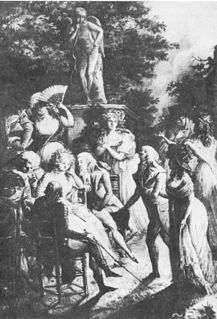 W
WThe Coppet group, also known as the Coppet circle, was an informal intellectual and literary gathering centred on Germaine de Staël during the time period between the establishment of the Napoleonic First Empire (1804) and the Bourbon Restoration of 1814-1815. The name comes from Coppet Castle in Switzerland.
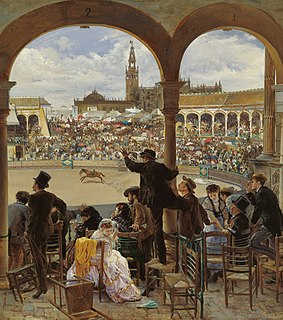 W
WCostumbrismo is the literary or pictorial interpretation of local everyday life, mannerisms, and customs, primarily in the Hispanic scene, and particularly in the 19th century. Costumbrismo is related both to artistic realism and to Romanticism, sharing the Romantic interest in expression as against simple representation and the romantic and realist focus on precise representation of particular times and places, rather than of humanity in the abstract. It is often satiric and even moralizing, but unlike mainstream realism does not usually offer or even imply any particular analysis of the society it depicts. When not satiric, its approach to quaint folkloric detail often has a romanticizing aspect.
 W
WThe Decadent movement was a late-19th-century artistic and literary movement, centered in Western Europe, that followed an aesthetic ideology of excess and artificiality. The visual artist Félicien Rops's body of work and Joris-Karl Huysmans's novel Against Nature (1884) are considered the prime examples of the decadent movement. It first flourished in France and then spread throughout Europe and to the United States. The movement was characterized by self-disgust, sickness at the world, general skepticism, delight in perversion, and employment of crude humor and a belief in the superiority of human creativity over logic and the natural world. Central to the decadent movement was the view that art is totally opposed to nature in the sense both of biological nature and of the standard, or "natural", norms of morality and sexual behaviour.
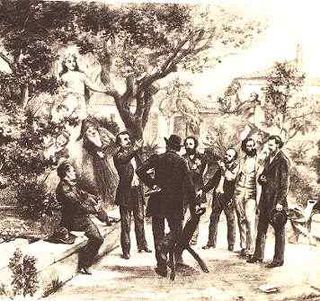 W
WThe Félibrige is a literary and cultural association founded in 1854 by Frédéric Mistral and other Provençal writers to defend and promote the Occitan language and literature. It is presided over by a capoulié.
 W
WThe Generation '45 was a group of writers, mainly from Uruguay, who had a notable influence in the literary and cultural life of their country and region. Their name derives from the fact that their careers started out mainly between 1945 and 1950.
 W
WThe term Generation Kindle refers to authors who publish their works digitally through Kindle Direct Publishing (KDP) for (Amazon.com). The term has been adopted by the media.
 W
WIndianism is a Brazilian literary and artistic movement that reached its peak during the first stages of Romanticism, though it had been present in Brazilian literature since the Baroque period.
 W
WThe Jindyworobak Movement was an Australian literary movement of the 1930s and 1940s whose white members, mostly poets, sought to contribute to a uniquely Australian culture through the integration of Indigenous Australian subjects, language and mythology. The movement's stated aim was to "free Australian art from whatever alien influences trammel it" and create works based on an engagement with the Australian landscape and an "understanding of Australia's history and traditions, primeval, colonial and modern".
 W
WThe Latin American Boom was a literary movement of the 1960s and 1970s when the work of a group of relatively young Latin American novelists became widely circulated in Europe and throughout the world. The Boom is most closely associated with Julio Cortázar of Argentina, Carlos Fuentes of Mexico, Mario Vargas Llosa of Peru, and Gabriel García Márquez of Colombia. Influenced by European and North American Modernism, but also by the Latin American Vanguardia movement, these writers challenged the established conventions of Latin American literature. Their work is experimental and, owing to the political climate of the Latin America of the 1960s, also very political. "It is no exaggeration", critic Gerald Martin writes, "to state that if the Southern continent was known for two things above all others in the 1960s, these were, first and foremost, the Cuban Revolution and its impact both on Latin America and the Third World generally, and secondly, the Boom in Latin American fiction, whose rise and fall coincided with the rise and fall of liberal perceptions of Cuba between 1959 and 1971."
 W
WMundane science fiction (MSF) is a niche literary movement that developed in the early 2000s (decade) which proposes "mundane science fiction" as its own subgenre of science fiction. MSF is typically characterized by its setting on Earth or within the Solar System; a lack of interstellar travel, intergalactic travel or human contact with extraterrestrials; and a believable use of technology and science as it exists at the time the story is written or a plausible extension of existing technology. The key tenets of the movement were set out in a 2004 manifesto written by Geoff Ryman and anonymous collaborators. There is debate over the boundaries of MSF and over which works can be considered canonical. Rudy Rucker has noted MSF's similarities to hard science fiction and Ritch Calvin has pointed out MSF's similarities to cyberpunk. Some commentators have identified science fiction films and television series which embody the MSF ethos of near-future realism.
 W
WNaturalism is a movement in European drama and theatre that developed in the late 19th and early 20th centuries. It refers to theatre that attempts to create an illusion of reality through a range of dramatic and theatrical strategies. Interest in naturalism especially flourished with the French playwrights of the time, but the most successful example is Strindberg's play Miss Julie, which was written with the intention to abide by both his own particular version of naturalism, and also the version described by the French novelist and literary theoretician, Émile Zola.
 W
WThe term neo-romanticism is used to cover a variety of movements in philosophy, literature, music, painting, and architecture, as well as social movements, that exist after and incorporate elements from the era of Romanticism.
 W
WGeorge Oppen was an American poet, best known as one of the members of the Objectivist group of poets. He abandoned poetry in the 1930s for political activism and moved to Mexico in 1950 to avoid the attentions of the House Un-American Activities Committee. He returned to poetry—and to the United States—in 1958, and received the Pulitzer Prize for Poetry in 1969.
 W
WRomanticism was an artistic, literary, musical, and intellectual movement that originated in Europe towards the end of the 18th century, and in most areas was at its peak in the approximate period from 1800 to 1850. Romanticism was characterized by its emphasis on emotion and individualism as well as glorification of all the past and nature, preferring the medieval rather than the classical. It was partly a reaction to the Industrial Revolution, the aristocratic social and political norms of the Age of Enlightenment, and the scientific rationalization of nature—all components of modernity. It was embodied most strongly in the visual arts, music, and literature, but had a major impact on historiography, education, chess, social sciences, and the natural sciences. It had a significant and complex effect on politics, with romantic thinkers influencing liberalism, radicalism, conservatism, and nationalism.
 W
WSastra wangi is a label given to a new body of Indonesian literature written by young, urban Indonesian women who take on controversial issues such as politics, religion and sexuality. Initiating the movement was writer Ayu Utami's best-selling first novel, Saman (1998), a contemporary view of Indonesian society published two weeks before the downfall of President Suharto. Large numbers of similar works by young women have followed.
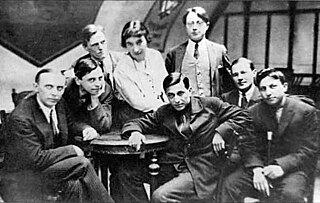 W
WThe Serapion Brothers was a group of writers formed in Petrograd, Russian SFSR in 1921. The group was named after a literary group, Die Serapionsbrüder, to which German romantic author E.T.A. Hoffmann belonged and after which he named a collection of his tales. Its members included Nikolai Tikhonov, Veniamin Kaverin, Mikhail Zoshchenko, Victor Shklovsky, Vsevolod Ivanov, Elizaveta Polonskaya, Ilya Gruzdev, Mikhail Slonimsky, Lev Lunts, Vladimir Pozner, Nikolay Nikitin and Konstantin Fedin. The group formed during their studies at the seminars of Yuri Tynyanov, Yevgeni Zamyatin, and Korney Chukovsky and the Petrogradsky Dom Iskusstv. The group was officially organized at its first meeting on February 1, 1921, and "as long as their headquarters remained in the House of Arts, met regularly every Saturday."
 W
WSignalism represents an international neo-avant-garde literal and art movement. It gathered wider support base both in former Yugoslavia and the world in the late 1960s and the beginning of the 1970s.
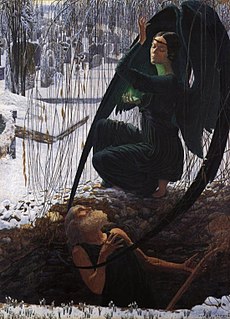 W
WSymbolism was a late 19th-century art movement of French, Russian and Belgian origin in poetry and other arts seeking to represent absolute truths symbolically through language and metaphorical images, mainly as a reaction against naturalism and realism.
 W
WVerismo was an Italian literary movement which peaked between approximately 1875 and the early 1900s. Giovanni Verga and Luigi Capuana were its main exponents and the authors of a verismo manifesto. Capuana published the novel Giacinta, generally regarded as the "manifesto" of Italian verismo. Unlike French naturalism, which was based on positivistic ideals, Verga and Capuana rejected claims of the scientific nature and social usefulness of the movement.
 W
WWeimar Classicism was a German literary and cultural movement, whose practitioners established a new humanism from the synthesis of ideas from Romanticism, Classicism, and the Age of Enlightenment. It was presumably named after the city of Weimar, Germany, because the leading authors of Weimar Classicism lived there.
 W
WYoung Vienna (Jung-Wien) was a society of fin de siècle writers who met in Vienna's Café Griensteidl and other nearby coffeehouses in the late nineteenth century.